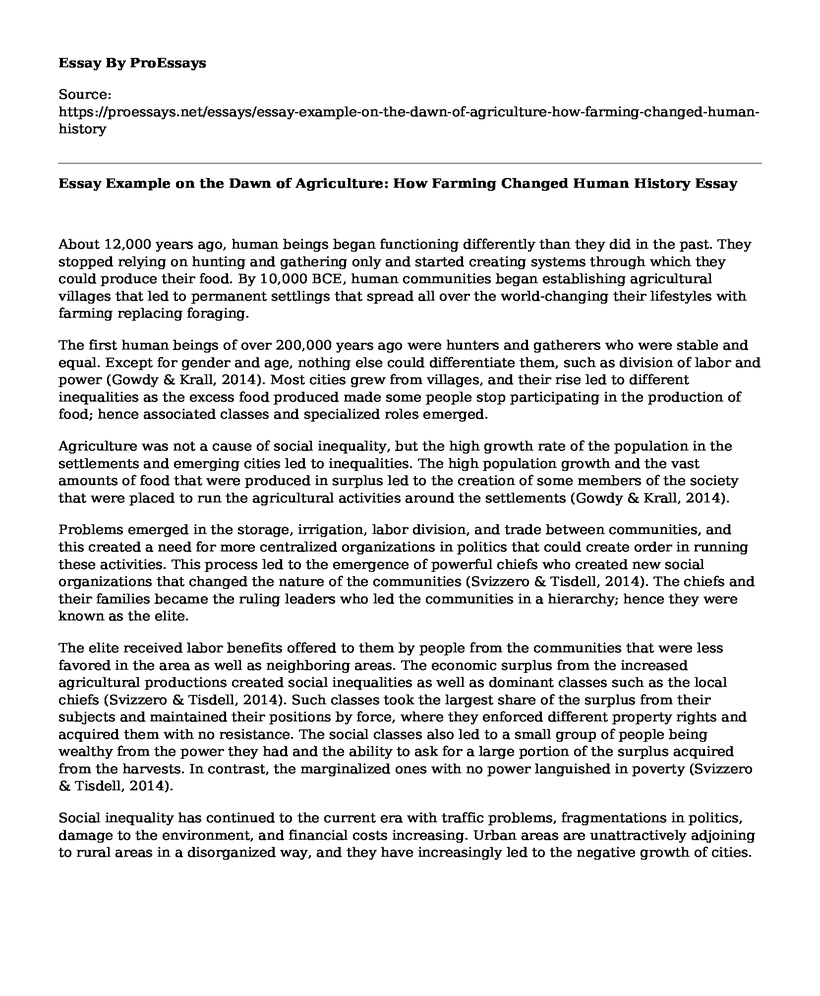About 12,000 years ago, human beings began functioning differently than they did in the past. They stopped relying on hunting and gathering only and started creating systems through which they could produce their food. By 10,000 BCE, human communities began establishing agricultural villages that led to permanent settlings that spread all over the world-changing their lifestyles with farming replacing foraging.
The first human beings of over 200,000 years ago were hunters and gatherers who were stable and equal. Except for gender and age, nothing else could differentiate them, such as division of labor and power (Gowdy & Krall, 2014). Most cities grew from villages, and their rise led to different inequalities as the excess food produced made some people stop participating in the production of food; hence associated classes and specialized roles emerged.
Agriculture was not a cause of social inequality, but the high growth rate of the population in the settlements and emerging cities led to inequalities. The high population growth and the vast amounts of food that were produced in surplus led to the creation of some members of the society that were placed to run the agricultural activities around the settlements (Gowdy & Krall, 2014).
Problems emerged in the storage, irrigation, labor division, and trade between communities, and this created a need for more centralized organizations in politics that could create order in running these activities. This process led to the emergence of powerful chiefs who created new social organizations that changed the nature of the communities (Svizzero & Tisdell, 2014). The chiefs and their families became the ruling leaders who led the communities in a hierarchy; hence they were known as the elite.
The elite received labor benefits offered to them by people from the communities that were less favored in the area as well as neighboring areas. The economic surplus from the increased agricultural productions created social inequalities as well as dominant classes such as the local chiefs (Svizzero & Tisdell, 2014). Such classes took the largest share of the surplus from their subjects and maintained their positions by force, where they enforced different property rights and acquired them with no resistance. The social classes also led to a small group of people being wealthy from the power they had and the ability to ask for a large portion of the surplus acquired from the harvests. In contrast, the marginalized ones with no power languished in poverty (Svizzero & Tisdell, 2014).
Social inequality has continued to the current era with traffic problems, fragmentations in politics, damage to the environment, and financial costs increasing. Urban areas are unattractively adjoining to rural areas in a disorganized way, and they have increasingly led to the negative growth of cities.
References
Gowdy, J., & Krall, L. (2014). Agriculture as a major evolutionary transition to human ultrasociality. Journal of Bioeconomics, 16(2), 179-202. https://www.researchgate.net/profile/John_Gowdy/publication/257578228_Agriculture_as_a_major_evolutionary_transition_to_human_ultrasociality/links/54a1739c0cf256bf8baf70b0/Agriculture-as-a-major-evolutionary-transition-to-human-ultrasociality.pdf
Svizzero, S., & Tisdell, C. A. (2014). Inequality and wealth creation in ancient history: Malthus' theory reconsidered. https://www.economics-sociology.eu/files/21_64_Svizzero_Tisdell.pdf
Cite this page
Essay Example on the Dawn of Agriculture: How Farming Changed Human History. (2023, Apr 24). Retrieved from https://proessays.net/essays/essay-example-on-the-dawn-of-agriculture-how-farming-changed-human-history
If you are the original author of this essay and no longer wish to have it published on the ProEssays website, please click below to request its removal:
- How Agriculture Has Improved in America Essay
- Is Agriculture a Mistake? - Essay Sample
- Essay on Agriculture Adapts to Climate Change: Innovations and Technologies.
- Essay Sample on Animal Agriculture: A Significant Contributor to Agro-Food Systems
- Essay Sample on Agricultural Automation: Boosting Productivity With Robotics and Challenges
- Essay Example on the Dawn of Agriculture: How Farming Changed Human History
- Essay Example on Agriculture's Role in the Industrial Revolution







